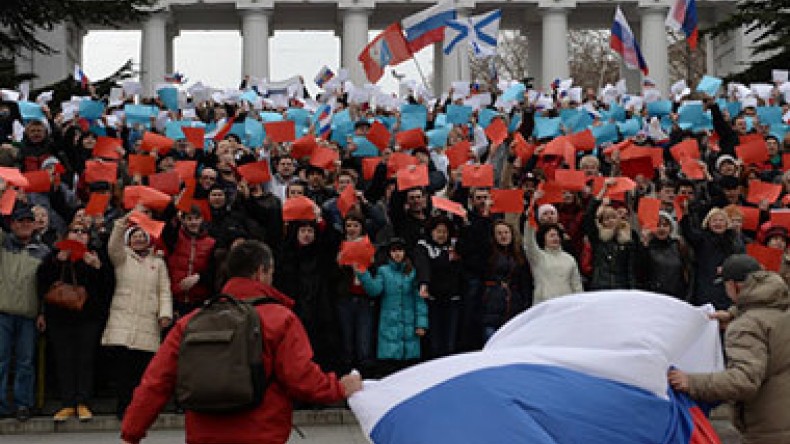
US abandoned international law, abides by ‘law of the jungle’ in Ukraine
Western powers are following an agenda to partition the map of the European region under which a portion of the Black Sea territory will be under US domination, former vice president of the OSCE Parliamentary Assembly, Willy Wimmer, told RT.
The veteran German politician, who served as a Defense Ministry state secretary, reminded that no Western government is talking about the extreme right element of the government in Kiev.
RT: More than a decade ago, you told your country's leadership of a disturbing connection between NATO's bombing of Yugoslavia and plans for the alliance's expansion. We have some extracts from the letter you wrote to then-Chancellor Gerhard Schröder after a conference organized by the US State Department. You raised concerns over some of the conclusions reached, such as: “It would be good, during NATO’s current enlargement, to restore the territorial situation in the area between the Baltic Sea and Anatolia (modern-day Turkey) such as existed during the Roman Empire...” Do you think these plans still exist? And, if so, could the Ukrainian crisis be playing a role?
Willy Wimmer: I think what I thought of Gerhard Schröder is similar to Angela Merkel in May 2000 - is exactly what is going on in these days. During the conference in Bratislava which was high ranking with state presidents, prime ministers, defense, and foreign ministers, and organized by the top leadership of the US State Department, they made a proposal to draw a line between Riga on the Baltic Sea, Odessa on the Black Sea, and Diyarbakir. All the territories west of this line should be under US domination, and the territories east of this line – they might be the Russian Federation or somebody else. That was the proposal – and when we see developments since then, I think it's like a schedule which had been presented to the conference participants; everything happens exactly as it was on the timetable in Bratislava.
RT: Let's take a look at another passage from your letter: “In all processes, peoples’ rights to self-determination should be favored over all other provisions or rules of international law.” That seemed to be agreed upon by high-profile Western diplomats taking part in that conference – why such staunch opposition to Crimea holding a similar referendum on its status now?
WW: Because they didn’t make it. What we saw since the middle of the ‘90s – I think caused all these problems we have here today. Until the mid-90s, all major powers agreed in international law, and in cooperation. But in the middle of the 90s, the US changed habits, changed attitudes. They no longer pursed international law, they proposed the law of the jungle. At the beginning was the war against Yugoslavia, and since then, Afghanistan, Iraq, Syria, Libya, everything is going because of these developments, and they no longer stick to international law and to cooperation. They make use of military might and this creates the trouble and the fear we have in Europe.
RT: Some argue that a referendum cannot be considered legitimate if it's not recognized by the interim authorities in Kiev. Let me ask you this – is the current government in Ukraine legitimate?
WW: I think it was a putsch, a coup d'état, what happened in Kiev. And what we heard in the news before – OSCE and other international bodies are doing what they can to create a legal framework for a government which is not legal at all.
The problem with this government is that they are not only not legal, they are working together with people who will be forbidden sooner or later by the Supreme Court here in Germany: right wing people, Nazis, fascists. It is interesting and outstanding that no western government is talking about these people who already created – once last century – disaster, terror, and wars in Europe, and now these people come back…
RT: Why is the legality then not being questioned and indeed the nationalist, the extremist element within the Kiev government?
WW: Because these new Nazis are our 'good Nazis’ now and this is disastrous for all of Europe.
RT: Are they a real threat? Because some people are exaggerating this nationalist element within the Kiev government. Russia is really concerned and indeed those people in Crimea and the east of the country. Do they have fears that are justified?
WW: It's not only the people in Ukraine or Crimea or in Russia; the fear is in Dusseldorf, Cologne, Paris,and London as well. We did not create this modern Europe to have these people back again.
RT: So what do you think the next step should be in this stalemate? The West is calling on Russia to revoke its support for the referendum in Crimea – do you believe that's what Moscow should do?
WW: I live here in Germany and next Thursday, the federal Chancellor Dr. Merkel will give a speech to the Bundestag about Ukraine and I expect – I’m not referring to Crimea or to Moscow or to Kiev, I expect here in Berlin – that she will address this Nazi question, that she will address the massacre on Maidan Square. If this happened in China, there would be an uproar in Western countries. Everybody is quiet here. Why doesn't the Council of Europe take into consideration to make an inquiry as well as the OSCE? I expect Merkel to address these issues. And we had a major party conference of our Bavarian brothers some days ago and the main speaker addressed the audience with an appeal not to forget the friendship with the Russian people.
Newsfeed
Videos






























